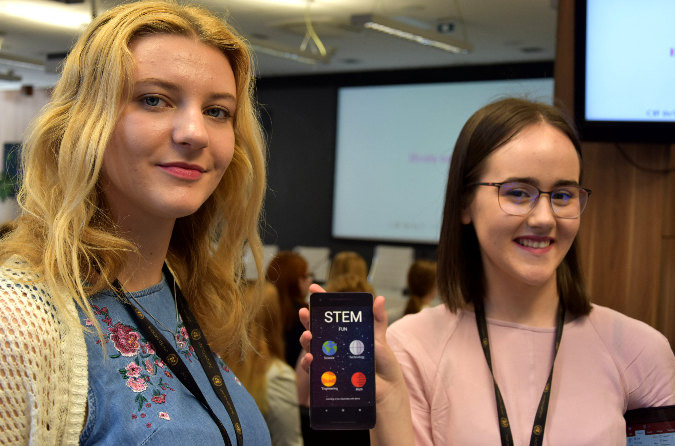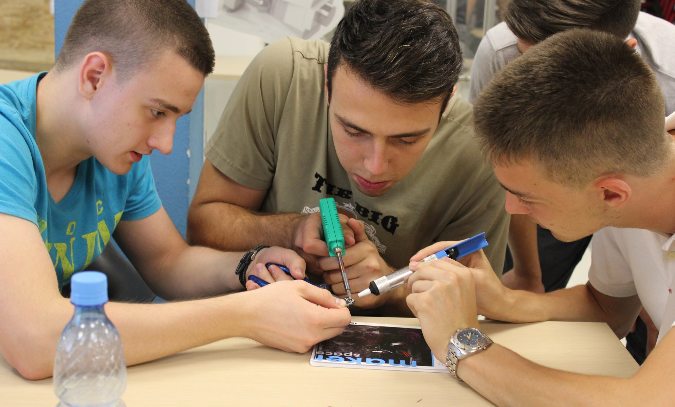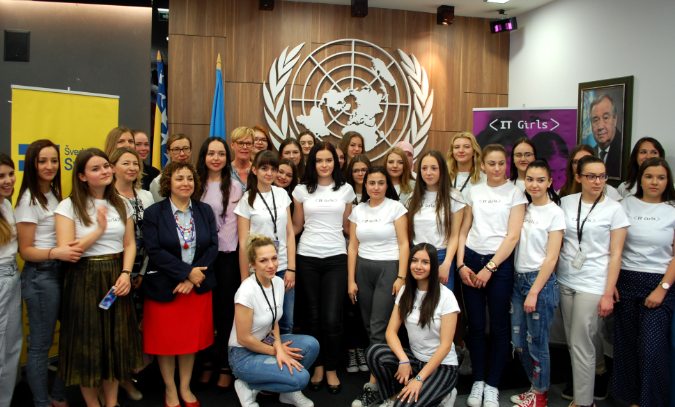Young people hack into a world of good in Bosnia and Herzegovina
Date:

It’s a simple idea with powerful potential in preventing gender-based violence. Wear a bracelet that can send an SMS alert if a risk arises.
The idea was one of several developed by high-school students alert to the possibilities of innovating for change. They took part in a UN Women-sponsored hackathon in December 2017, with the two winning teams supported to advance their innovations through technical development, a business plan and a marketing strategy.
The “TraceBrace” team won first place for the bracelet after a marathon 48 hours of hacking solutions to end violence. Six friends from the city of Tuzla who love tinkering with technology and had been peer educators in the local Be a Man club – an initiative to engage men and boys in accelerating gender equality – came up with the concept.
All young men, team members stress: “We’re feminists! Our end goal is to turn off the violence against women firstly in our country and then in the whole world!”

They observed that most existing tech solutions involved online platforms and helplines for women and girls facing violence. But there was nothing that could trigger an immediate response and stop violence before it starts.
By working with UN Women and Networks, a business start-up accelerator, the team has finetuned its initial prototype, connected with other startups, and is now on the way to creating a company and starting production. Cooperation with Viber has led to discussions around integration in its instant messaging app. Edhem ‘Eddie’ Čustović, a leading champion of start-ups, has backed development with his BH Futures Foundation.
A group of female high school students from Zenica and Tuzla took second prize in the hackathon for the first online platform providing peer support and information on gender-based violence specifically to young girls. The site features quizzes, news and blogs, and will be promoted on television as well as through visits to high schools. Team member Nedžla Karalić, 15, says, “Our aim is to raise awareness among our peers and initiate change in our society. UN Women believed in our idea and gave us a moral support that was a strong motivator. We worked hard to come up with the best possible result.”

“Young men, boys and girls need to be committed to advocate zero tolerance for gender-based violence. That is why I am so optimistic to see young men and women developing new tools, new approaches,” says David Saunders, UN Women Representative in Bosnia and Herzegovina. “UN Women is proud to work with some high school students and support their innovative approaches. They are our future!”
Empowering young people as agents for change depends critically on closing the digital gender gap. Even though girls now outnumber boys in tertiary education in Bosnia and Herzegovina, three times more men study in fields related to technology. UN Women partners with the United Nations Children’s Fund (UNICEF) and the United Nations Development Programme (UNDP) on IT Girls to encourage girls to explore information and technology careers.
Around 380 girls and young women have taken part in coding challenges and competitions. Ten robotics workshops for girls in primary schools have been sponsored through a UN-coordinated crowd funding campaign in partnership with Bit Alliance, an association of IT companies.
A mobile-app competition to mark 2018 International Girls in ICT Day brought together 80 girls and young women from seven locations. Two teams developed apps. One, available on Google Play, encourages girls to learn about science, technology, engineering and math. Another manages electricity for smart, energy-saving homes.
“I finally found hope for us, young people, and especially girls who wish to make a change,” says Jasmina Zahirovic, 18, from Tuzla, who led the team that devised the energy app. “We proved that girls can indeed code and they can be just as good at developing apps and gadgets as boys. We will go on making our dreams come true and using IT to make a change in our society.”